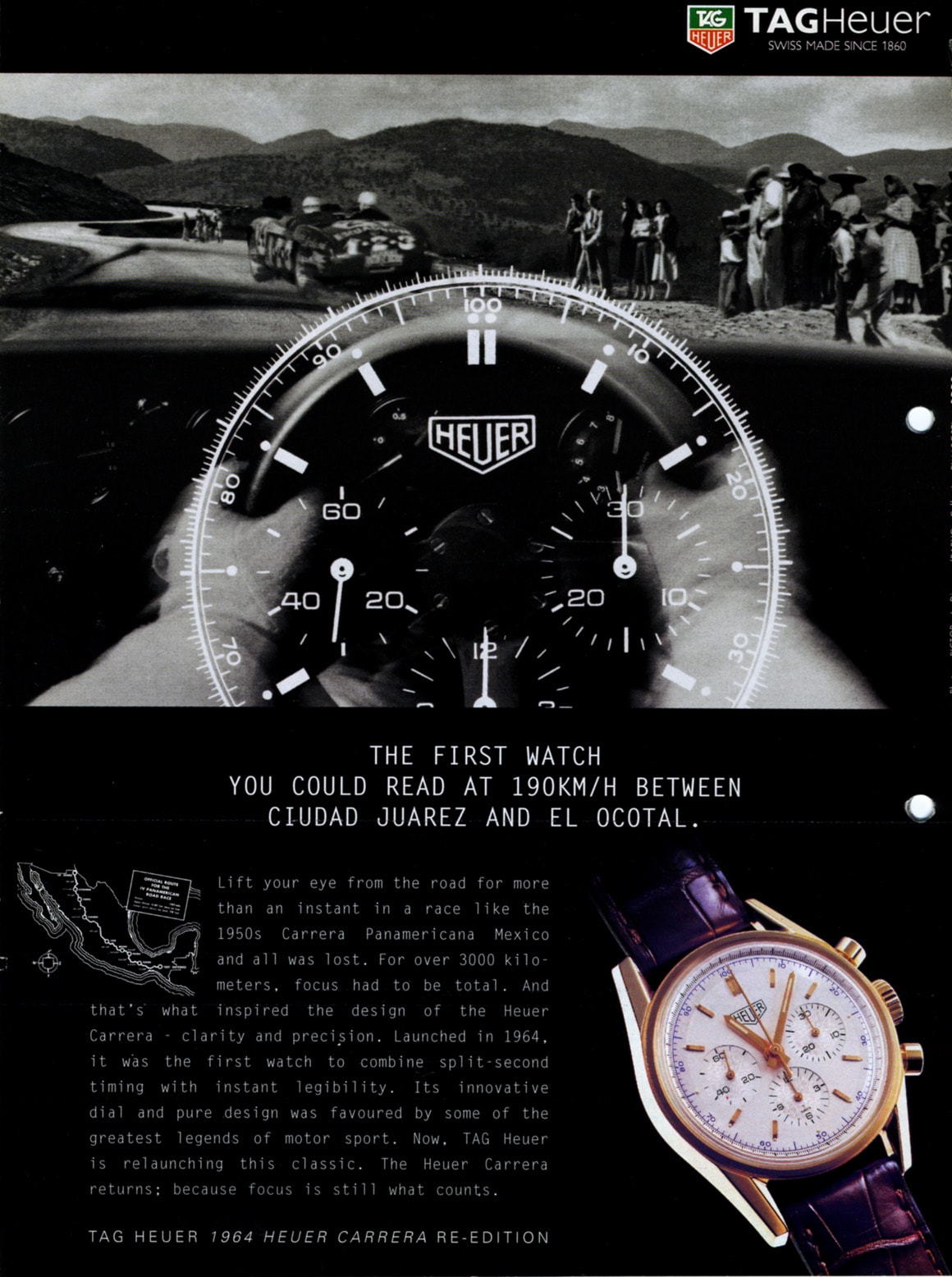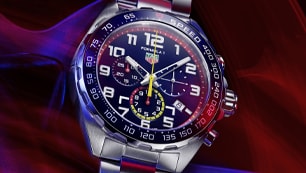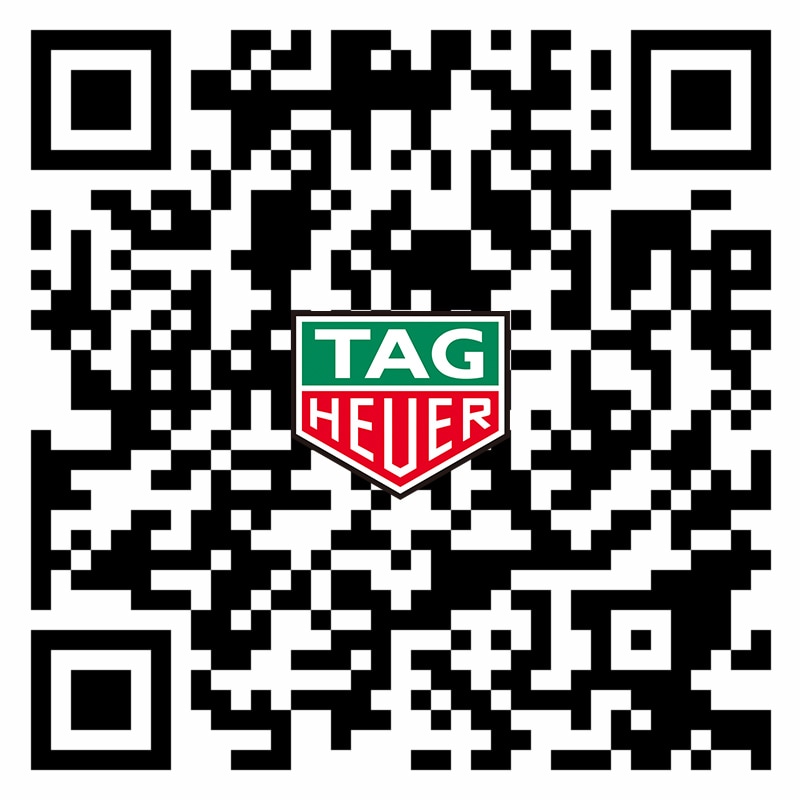TAG HEUER CARRERA RE-EDITION 1996
In 1996, when TAG Heuer looked to its heritage catalog for the ideal watch to re-issue, the first Carrera from 1963 was the natural choice. The Carrera’s timeless design would prove to be popular at the end of the century, as it was three decades earlier. The success of the Carrera that TAG Heuer introduced in 1996 motivated enthusiasts to focus on the original vintage models and also paved the way for re-editions of other models. Over the years since this first re-edition of the Carrera, the Carrera has become a mainstay of the TAG Heuer catalog going far beyond any collection that Jack Heuer could have possibly imagined, when he first heard the name “Carrera” standing in the pits at Sebring, back in 1962.
The decade from 1985, when the last version of the Carrera was introduced, to 1995 was a period of transformation for TAG Heuer. As the new ownership by Techniques d'Avant Garde took hold, and the market for Swiss watches changed rapidly, TAG Heuer embarked on a new strategy for its collections. Dive watches would dominate the TAG Heuer catalog, with the popular Series 2000 being introduced in 1985, with the Formula 1 collection being introduced in 1986 and the S/el (to be renamed, “Link”) coming in 1987. All three of these collections continue to this day.
With the popularity of its dive watch, Formula 1 and S/el collections, in 1996 TAG Heuer could look back at its classic chronographs from the 1960s for its next collection. And so in September 1996, on the weekend of the Italian Grand Prix, at Monza, TAG Heuer assembled racers from its glory days of the 1960s and other VIPs, to introduce the new Carrera. But of all the VIPs at Monza, there was one who drew particular attention and affection. Fourteen years after selling the 120 year-old family business, Jack Heuer was back at Monza, chatting with his Formula 1 friends, but it was more than a social visit. The man who had first conceived of the Carrera chronograph, at the racetrack in 1962, the man who had introduced the first automatic Carrera in 1969, was introducing a new Carrera.
This would be a Carrera that drew from the very first model of 1963, but more importantly, this would be a Carrera that would be the first of a series of timepieces that would fuel the passion of racing enthusiasts, to this very day.

DESIGN
The Carrera re-edition was launched with three models in the range- the black-dial Carrera in a stainless steel case (CS3111), the white-dial Carrera in a stainless steel case (CS3110) and the white-dial Carrera an 18 karat gold case (CS3140).
This first Carrera re-edition was true to the original Heuer Carrera from 1963 in almost every aspect, from the 36mm stainless steel case, to the geometry of the pushers and crown to the dial and sub-dial design. All three versions of the 1996 Carrera re-edition have the decimal scale printed on the dial, which was one of the versions available in 1963 (the reference 2447 D). The decimal minutes scale evokes the use of the Carrera chronograph as a tool for racing, as rally instructions and navigation are expressed in 1/100s of minutes, rather than seconds. The “telltale” to distinguish the re-edition from the original models from 1963 is that the original models had the text “Carrera” on the dial, above the Heuer shield, while the re-edition does not.
THE MOVEMENT
The Carrera re-edition models from 1996 are powered by the manual-wind Lemania 1873 movement. While the Lemania 1873 substitutes cams for the column wheel used in the Valjoux 72 movement of the original Carrera, in an era when many chronographs were growing larger, the relatively small size of the movement (12 ligne, versus 13 for the Valjoux 72) allowed TAG Heuer to maintain the dimensions of the original Carrera case.
.png)
FRANCO BARESI EDITION CARRERA “20 YEARS OF MILAN”
In 1999, Italian Football powerhouse A.C. Milan celebrated its centenary by allowing fans to vote on their “player of the century”. The winner was local hero Franco Baresi, who played his entire 20 year career at A.C. Milan. To commemorate the occasion, a special edition of the white dial Carrera re-edition (CS3110) was commissioned, with 200 watches made. The watch has the same reference number as the standard edition.
THE HEUER RE-EDITION RANGE
The success of the first re-edition of the Carrera in 1996 meant that the re-edition series became more than just a one-off for TAG Heuer. Following the success of the Carrera re-edition, TAG Heuer expanded the Carrera re-edition range and introduced the Monaco re-edition in 1997. Other models such as the Monza would follow in 2000 and the Autavia in 2003












